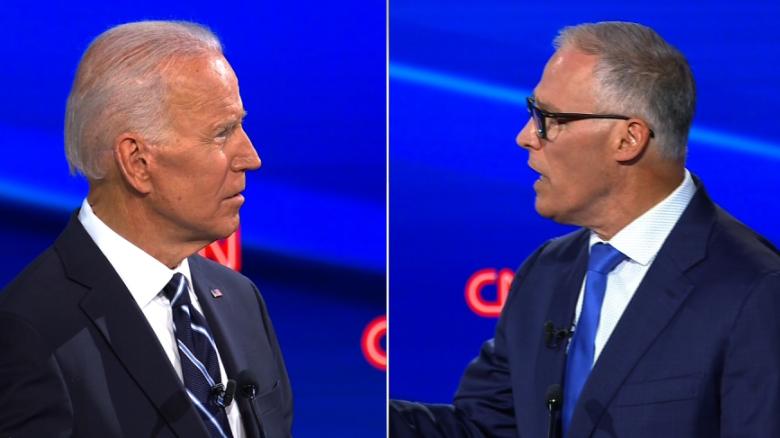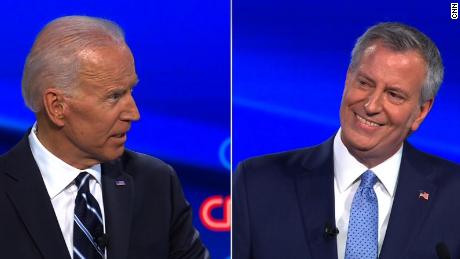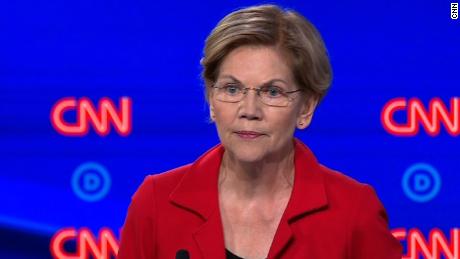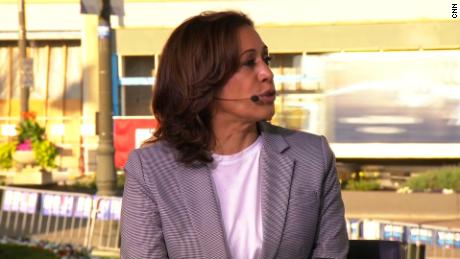Detroit (CNN)The most progressive Democratic presidential contenders showed over two nights in Detroit that they are ready for an ideological clash to define the party -- and former Vice President Joe Biden showed he is ready to give it to them.
The first debate night, Tuesday, was all about ideology: Sens. Elizabeth Warren of Massachusetts and Bernie Sanders of Vermont spent the night answering to attacks from low-polling moderates like former Rep. John Delaney of Maryland and former Colorado Gov. John Hickenlooper. Both emerged unscathed, and for them the debate was largely a warm-up for higher-stakes battles with Biden that will come in the months ahead.
The second night got bitter and personal. Biden, who had entered the race decrying the "circular firing squad," brought opposition research. Sen. Kamala Harris of California saw opponents pick through her record as attorney general. Even former President Barack Obama was a bit of a punching bag on immigration.
Here are seven things we learned from the Detroit debate:
Biden was ready to rumble
The former vice president and his aides were determined to avoid another lackluster showing after he was unprepared to forcefully defend his record on race in the first debate, in June.
And he stepped it up, delivering a much feistier performance.
The question is, what did Democratic voters see: Was it a strong figure who showed he could answer anything thrown at him -- and therefore is ready to take on President Donald Trump? Or did Biden suffer from the cumulative effect of Democrats hitting him on issue after issue?
Biden stopped at one point and said, "Everybody's talking about how terrible I am on all these issues."
His next sentence -- "Barack Obama knew exactly who I was" -- was how he fought back.
Biden mounted a strong, detailed defense of his call for an Obamacare 2.0-style approach to health care, rather than more progressive candidates' proposals for "Medicare for All."
He fended off attacks from Sen. Kirsten Gillibrand of New York over his decades-old vote on a child care tax credit and from Harris on his flip-flop on the Hyde Amendment, which bars federal dollars from paying for abortions in most instances.
He was also ready with opposition research of his own. "Google '1,000 prisoners free Kamala Harris,' " he told viewers at one point during an attack on the Harris' tenure as California attorney general.
Potentially more damaging, though, were exchanges on immigration and criminal justice.
Sanders and Warren are putting Biden on notice
If the second debate night was more personal, the first round in Detroit offered voters a wider lens of the ideological conflict inside the Democratic Party.
Warren summed it up with a thumping rejoinder during a tense exchange with Delaney. The former congressman from Maryland was the most vocal moderate skeptic onstage and used much of his time to argue that programs like Medicare for All were unfeasible or, as he put it, the product of "fairytale economics."
Exasperated, Warren eventually shot back with one of the night's most memorable lines -- one we'll almost surely hear again.
"I don't understand why anybody goes to all the trouble of running for president of the United States to talk about what we really can't do and shouldn't fight for," she said.
In a single sentence, Warren neatly summed up the progressive argument against the "pragmatism" of the campaign's moderates. It's an argument you can imagine her making during a face-off with Biden.
Biden, though uneven across two debates so far, will present a more challenging matchup when the time comes.
Still, Warren and Sanders made clear on Tuesday night that they are as committed to changing the context of the debate as winning the night on points. The challenges ahead for Warren and Sanders are more daunting, but if Detroit taught us anything, it's that the progressives are willing to stick together, setting aside their minor differences, in pursuit of a larger goal. And in the context of this primary, that means taking down Biden.
Obama isn't the perfect shield
One exchange demonstrated how Democrats, who still embrace much of Obama's record and hold up his approach to the presidency as the gold standard, are increasingly willing to make at least implicit criticisms of the former president on some policy matters.
Biden -- who has placed his time as Obama's vice president at the center of his campaign -- was confronted by his Democratic rivals who were critical of Obama-era deportations of undocumented immigrants.
Biden was attacked by Sen. Cory Booker of New Jersey, New York Mayor Bill de Blasio and former Housing and Urban Development Secretary Juli├Īn Castro -- who, like Biden, served in the Obama administration.
"It looks like one of us has learned the lessons of the past and one of us hasn't," Castro said to Biden. "We need someone who actually has guts on this issue."
De Blasio pressed Biden on whether he had counseled Obama to halt the deportations.
"Did you say those deportations were a good idea or did you go to the President and say, 'This is a mistake. We shouldn't do it'?" de Blasio asked.
Biden said he wouldn't talk publicly about the advice he had given Obama privately on the issue -- and that's when Booker piled on.
"You can't have it both ways," Booker said. "You invoke President Obama more than anyone in this campaign. You can't do it when it's convenient and then dodge it when it's not."
The health care debate is just getting started -- but the goalposts are planted
On both nights, the debate over health care was the most substantive and heated.
After the Detroit debate, the battle lines on the issue -- which frequently polls as the top Democratic priority -- are more clearly drawn than ever before.
By supporting Medicare for All, Sanders and Warren aren't simply advocating a plan. They also are campaigning to change the way Americans think about health care. The most telling moment came on Tuesday night.
In making the case for his health care plan, Delaney noted that he was "the only one on the stage with experience in the health care business." Before he could finish his point, Sanders interjected, saying: "It's not a business." Moments later, Warren backed up Sanders when she asked, "Why does every hospital have to fill out so many complicated forms?"
The answer, Warren said, is that "it gives insurance companies a chance to say 'no,' and to push that cost back on the patient."
Health care in 2019 is very much a business and while Obamacare brought the federal government more deeply into the industry's operations, it remains healthy and wildly profitable for the biggest insurers. Sanders is arguing for a paradigm shift -- and asking Americans to reject the underlying idea that health care policy should take into account business interests.
Whether or not the American public and its elected officials are willing to make that leap is an open question. It seems unlikely given the current state of affairs in Washington. But there is another, less easily perceptible shift happening, and it's not only among the party's leading progressives.
Harris, former Rep. Beto O'Rourke of Texas and South Bend, Indiana, Mayor Pete Buttigieg are tops among the candidates suggesting or proposing plans that would -- just a few years ago -- be regarded as radical remakings of the system.
Even Biden's proposal, which would create a government-run insurance plan, known as a "public option," and offer significant new subsidies on the Obamacare exchanges, represents a notable shift -- and it's roundly described as among the most moderate plans.
The public option was a casualty of the original Obamacare fight, ultimately left out of a bill crafted when Democrats controlled both chambers of Congress and the White House. Today, it is essentially a given that any Democratic president would insist on the measure being included in any major health care legislation.
Moving up means wearing a bigger target
Polls showed Harris was the clear winner of the June debate -- which meant that in Detroit, everyone else wanted to seize the momentum that she had.
Harris began the night in a precarious position. Days earlier she'd rolled out a health care plan that aimed to deliver Medicare for All by using private insurance as the vehicle -- an approach that pleased neither progressives nor moderates, and meant she was on defense for the entire first portion of the debate, which was devoted to the issue, on night two.
Later, Rep. Tulsi Gabbard of Hawaii launched perhaps the most scathing attack of the night, knocking Harris' record as attorney general of California.
"There are too many examples to cite, but she put over 1,500 people in jail for marijuana violations and then laughed about it when she was asked if she ever smoked marijuana," Gabbard said.
Harris' response was similar to how Biden had defended himself on a range of issues: She argued that her record reflects she has a long history of working to overhaul the criminal justice system.
Biden showed he had been picking through Harris' record, too.
He faulted Harris for defending cases that were found to have involved prosecutorial misconduct and for not disclosing more quickly to defense attorneys that evidence in the San Francisco crime lab had been tampered with.
Campaigns sometimes talk about the perils of peaking too early. While most would rather be in Harris' position right now, the criticism she faced was a reminder that emerging as a top-tier contender comes with increased scrutiny.
The ideological middle is no-man's-land
Both nights exposed the real ideological divisions in the Democratic Party between progressives who are arguing for systemic change to combat issues that predate Trump and moderates who essentially want to return politics to the pre-Trump era.
On night one, the two top-tier progressives, Warren and Sanders, easily fended off a barrage from long-shot contenders who saw the debate as their best chance to build the momentum it will take to reach the higher fundraising and polling thresholds to qualify for future debates.
On the second evening, Biden was a forceful voice for moderation, and much of the night revolved around attacks on his record.
That left candidates who fit somewhere in the middle of the pack ideologically struggling to break through.
Buttigieg, O'Rourke and Sen. Amy Klobuchar of Minnesota, in particular, were lost in the shuffle.
O'Rourke and Buttigieg did deliver moments that thrilled their supporters.
O'Rourke was the first Democrat to argue for a step toward reparations for slavery. "The very foundation of this country -- the wealth that we have built, the way we became the greatest country on the face of the planet -- was literally on the backs of those who were kidnapped and brought here by force," he said.
Buttigieg, meanwhile, made a forceful case for structural changes such as adding seats to the Supreme Court and ending the Electoral College. "This is a country that once changed its Constitution so you couldn't drink and changed it back because we changed our minds, and you're tell me we can't reform our democracy in our time. We have to, or we will be having the same argument 20 years from now," he said.
Still, since they sat outside the progressives-vs.-moderates ideological conflict that drove the debate, they never felt central to the action.
Booker broke through
No one appeared to have the sort of standout moment that Harris had in the first debate, when she assailed Biden's previous opposition to federally mandated school busing.
But Booker did what he'd hoped to do on the second night: He was central to the action, prodding at Biden's record on immigration, criminal justice and more -- and no one landed any real attacks on Booker's own record.
Early on, he stayed out of the fray on health care, arguing that Trump benefits from pitting progressive Democrats against moderates.
Later, he got the best of Biden during exchanges on immigration, criminal justice and climate change.
When Biden tried to defend himself by pinning blame on Booker for racist practices of the Newark, New Jersey, police department, Booker shot back: "There's a saying in my community. You're dipping into the Kool-Aid and you don't even know the flavor."
Later, when the candidates were discussing climate change, Booker retorted: "Nobody should get applause for rejoining the Paris climate accord. That is kindergarten."
He also won over the Detroit crowd by warning Democrats to be ready for an "all-out assault" on African Americans' ability to vote in the 2020 election.
"We lost the state of Michigan because everybody from Republicans to Russians were targeting the suppression of African American voters," he said. "We need to say that."


























